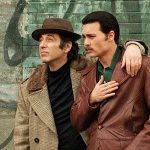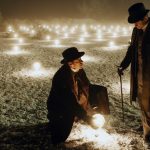The Wind That Shakes the Barley (2006)

The Wind That Shakes the Barley (2006), directed by Ken Loach, is a powerful and haunting historical drama that delves into the Irish War of Independence (1919–1921) and the subsequent Irish Civil War (1922–1923). Winner of the prestigious Palme d’Or at the Cannes Film Festival, the film provides an intimate and deeply emotional look at the personal and political struggles that arose during one of Ireland’s most turbulent periods. With its raw storytelling, stellar performances, and unflinching portrayal of the cost of war, The Wind That Shakes the Barley is both a gripping narrative and a poignant meditation on the complexities of revolution and resistance.

Set in rural County Cork, Ireland, the film follows two brothers, Damien (played by Cillian Murphy) and Teddy O’Donovan (played by Pádraic Delaney), as they find themselves on opposite sides of the conflict. Initially united by their shared opposition to British occupation, the brothers join the Irish Republican Army (IRA) to fight for Ireland’s independence. However, as the struggle intensifies and the British forces are eventually driven out, a treaty is signed that divides the country into the Irish Free State and Northern Ireland. This agreement, which grants partial independence but requires allegiance to the British Crown, sparks a bitter civil war, pitting former comrades—and the O’Donovan brothers—against each other.
The film begins with a serene yet tense portrayal of life under British rule, where the rural Irish community is subject to violent repression by the Black and Tans, an infamous auxiliary police force. The brutality of the occupiers is shown early on, with young men being harassed and killed for speaking Irish or resisting British authority. This atmosphere of fear and oppression sets the stage for Damien, a young medical student planning to move to London, to abandon his career aspirations and join the IRA after witnessing a series of atrocities.

Cillian Murphy delivers a nuanced and emotionally charged performance as Damien, portraying a man whose initial reluctance to take up arms is replaced by a fierce commitment to the cause. His transformation from a pacifist to a revolutionary is depicted with remarkable depth, as he grapples with the moral compromises and personal sacrifices required by the struggle for freedom. Murphy’s portrayal captures the internal conflict of a man who is torn between his ideals and the harsh realities of war.
Teddy, on the other hand, is a natural leader who is unwavering in his dedication to the fight for Irish independence. Pádraic Delaney brings a commanding presence to the role, embodying Teddy’s strength and pragmatism. The brothers’ relationship is central to the film, and their eventual ideological split over the treaty serves as a microcosm of the broader divisions that tore Ireland apart during the civil war. Their journey from allies to adversaries is heartbreaking, underscoring the devastating human cost of political discord.

Ken Loach’s direction is masterful, grounding the film in a sense of authenticity and realism. The cinematography by Barry Ackroyd captures the rugged beauty of the Irish countryside, juxtaposing its natural serenity with the violence and turmoil of the era. Loach’s use of natural light and handheld cameras enhances the film’s raw, documentary-like feel, drawing viewers into the lives of the characters and the world they inhabit.
The film’s script, written by Paul Laverty, is both thoughtful and provocative, blending historical detail with deeply personal storytelling. Laverty’s dialogue captures the political debates of the time, exploring the philosophical and practical tensions between those who supported the treaty as a step toward independence and those who viewed it as a betrayal of the revolution’s ideals. These ideological conflicts are brought to life in powerful scenes of debate, where the characters passionately argue their positions, revealing the depth of their convictions and the stakes of their choices.

One of the film’s strengths is its refusal to romanticize war or revolution. While it honors the bravery and sacrifice of those who fought for Ireland’s independence, it does not shy away from showing the moral ambiguities and internal divisions that often accompany such struggles. The film depicts moments of heroism and solidarity alongside acts of betrayal, cruelty, and despair, presenting a complex and unvarnished portrait of history.
The title of the film, The Wind That Shakes the Barley, is derived from a 19th-century Irish song that laments the sacrifices made during earlier uprisings against British rule. This connection to Irish cultural heritage adds another layer of poignancy to the story, emphasizing the long history of resistance and the enduring impact of colonialism on the Irish people.

The film’s emotional resonance is heightened by its score, composed by George Fenton, which blends traditional Irish folk music with a hauntingly minimalist soundscape. The music underscores the film’s themes of loss and resilience, adding an emotional depth that lingers long after the credits roll.
In its final moments, The Wind That Shakes the Barley delivers a devastating conclusion that encapsulates the tragic consequences of civil war. The personal and political conflicts reach a heartbreaking climax, leaving viewers with a profound sense of the sacrifices made by those who fought for Ireland’s independence and the enduring scars left by the divisions that followed.

The Wind That Shakes the Barley (2006) is a deeply moving and thought-provoking film that offers a searing exploration of the Irish struggle for independence and the internal conflicts that arose in its aftermath. With its compelling performances, meticulous direction, and unflinching depiction of the human cost of war, the film stands as a powerful reminder of the complexities of history and the enduring impact of political conflict. Ken Loach’s masterful storytelling and Cillian Murphy’s remarkable performance make this film a must-watch for anyone interested in history, politics, or the resilience of the human spirit.











